Cover Songs
Though most of Puffy's recorded output, to date, has been written mostly by outside songwriters, Puffy generally are the first artists to record the songs. However, there have been occassions in the past where Puffy have recorded or sang songs orignally made popular by other artists - most of these cover tunes are either concert-only songs or have been released on tribute discs. Sometimes, though, cover songs make their way into Puffy's official catalogue - The Hit Parade and its accompanying singles being the most notable occurrence. This page hopes to be a listing of those songs by other artists that Puffy have sang over the years.
Click on a song title to learn more a little about the original version and where you can find Puffy's version. Do note that this list only takes into account cover songs that Puffy have commercially released, whether it be on CD or DVD - they've probably performed other cover tunes in various concerts that aren't listed here.
This page is a work in progress, so please be patient.
Thanks to Puffy715 for pointing out "Lucy wa Moon Face" was originally done by Sparks Go-Go, which I didn't know previously.
Ai ga Tomaranai ~Turn It Into Love~ | Ai no Tameni | Aishuu de Ito ~NEW YORK CITY NIGHTS~ | Aoi Namida | Basket Case | Beef | Can-Nana Fever | Cherry | Choushou | Don't Bring Me Down | Girls Just Want to Have Fun | Hataraku Otoko | Hi-Teen Boogie | Hito Natsu no Keiken | Hito ni Yasashiku | Hot Limit | Hurricane | I Wanna Be Your Man | Image Down | Joining a Fan Club | Kakkoman Boogie | Lucy in the Sky With Diamonds | Lucy wa Moon Face | Maybe Blue | Nagisa no Sindbad | Nantettatte Idol | Ningen ha mou Owari da! | Not Listening | Owaranai Uta | Radio Tokyo | Shopping | Subarashii Hibi | Tenshi no Wink | Umi no Sei | Yuki ga Furumachi
Ai ga Tomaranai ~Turn It Into Love~
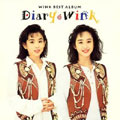 Words & Music: Mike Stock, Matt Aiken & Pete Waterman (SAW); Japanese translation by Neko Nogawa
Words & Music: Mike Stock, Matt Aiken & Pete Waterman (SAW); Japanese translation by Neko Nogawa
Original Version: "Ai ga Tomaranai ~Turn It Into Love~" c/w “Ding Ding ~Koi ka ra Hajimaru Futari no Train~” (single) by Wink, November 16, 1988
Puffy's Version: B-side to Aoi Namida single, also featured on The Hit Parade
Wink was a popular two-woman vocal group compromised of Aida Shoko and Suzuki Sachiko. Apparently the two women competed against each other in a fashion competition of some sort, and not long after were put together to form a singing duo. From their beginning in 1988 through the early 1990s, Wink were a music phenomenon: their singles spent many weeks on the Oricon charts, usually attaining a very high chart position. They officially disbanded in 1996 amidst falling sales and general public disinterest.
"Ai ga Tomaranai," Wink's third single, was a cover of a Kylie Minogue song ("Turn It Into Love," from her debut album Kylie, released in July of 1988). Wink's Japanese-language version was a smash in their homeland, reaching #1 on the Oricon single chart (spending a total of 40 weeks on the chart). Interestingly, it seems that Kylie Minogue's version of the song was released as a single (in Japan only) in December of 1988 - thus competing directly with Wink's version - and apparently also hit #1.
Return to Top
Ai no Tameni
Words & Music: Tamio Okuda
Original Version: "Ai no Tameni" c/w “Aisuru Hito yo” (single) by Tamio Okuda, October 21, 1994
Puffy's Version: Live performance featured on Fever*Fever DVD
Puffy - especially in their early days, when their catalogue wasn't so deep - would often resort to covering songs Tamio Okuda had written for other projects (usually old Unicorn or solo Tamio songs); this is seen best on the Tour! Puffy! Tour! DVD, when Ami and Yumi performed nearly all of amiyumi plus three additional then-new singles, and still ended up adding two more solo Tamio songs to the set list. This wouldn't seem to be the case with "Ai no Tameni," though; perhaps Ami and Yumi liked the song and included it in their set. Or, perhaps its inclusion in the live set list had to do with the fact that "Ai no Tameni" is actually mentioned in the fadeout of "Dare ga Sore wo" along with a bunch of other Puffy songs.
As for Tamio's version of the song, it went to #2 on the Oricon charts and spent 18 weeks there.
Return to Top
Basket Case
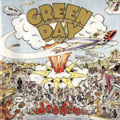 Words: Billy Armstrong Music: Billy Armstrong, Michael Pritchard, Frank Wright
Words: Billy Armstrong Music: Billy Armstrong, Michael Pritchard, Frank Wright
Original Version: Dookie (album) by Green Day, February 1, 1994
Puffy's Version: Studio version - bonus track on Splurge (Japan Version); Live version - on Hit & Fun (Limited Edition) bonus disc
Green Day - Billy Joe Armstrong (guitar, vocals), Mike Dirnt (bass) and Tré Cool (drums) - are a pop/rock/punk band originally hailing from California. They first rose to prominence in the mid-1990s on the strength of their Dookie album (featuring "Basket Case," which was later released as a single), and became pretty big news. They've continued their string of hit records to this day, with their most recent album American Idiot being a pretty big hit, despite many punk rock purists labeling the band as sell-outs for their catchy rock songs, among other things (like Billy Joe Armstrong's Cockney accent when he sings, despite the fact he's from southern California).
It should be noted that there are a number of Japanese rock acts - like Puffy and Shonen Knife, to name two - that are Green Day fans.
Return to Top
Beef
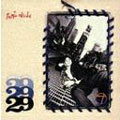 Words & Music: Tamio Okuda
Words & Music: Tamio Okuda
Original Version: 29 (album) by Tamio Okuda, March 8, 1995
Puffy's Version: Live performance featured on Funclips Funclub
This song was featured on Tamio Okuda's first solo record after Unicorn split. Like most of Tamio's work, the album was a big success, reaching #2 and staying on the charts for 16 weeks.
Puffy performed this song at a special Tamio Okuda tribute concert. Their backing band on this track included Puffy stalwarts Osada Susumu (guitar) and Negishi Takamune (bass), along with detroit7 guitarist Nabana Tomomi and drummer Araki Yuko.
Return to Top
Cherry
 Words & Music: Masamune Kusano
Words & Music: Masamune Kusano
Original Version: "Cherry" c/w "Bunny Girl" (single) by Spitz, April 10, 1996
Puffy's Version: Track 4 on The Hit Parade
Spitz are a popular rock band in Japan, whose members include: Masamune Kusano (vocals, guitar, songwriter), Tetsuya Miwa (guitar), Akihiro Tamura (bass, band leader), and Tatsuo Sakiyama (drums). They formed in 1987, and recently celebrated 10 years together as a band. "Cherry" was a big hit for Spitz, going all the way to #1 on the Oricon singles chart and spent an amazing 27 weeks total on said chart.
Additionally, Spitz vocalist Kusano Masamune has written two songs for Puffy over the years - "Ai no Shirushi" and "Koi no Etude."
Return to Top
Choushou
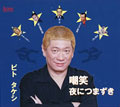 Words: Kitano Takeshi Music: Kouji Tamaki
Words: Kitano Takeshi Music: Kouji Tamaki
Original Version: "Choushou" c/w "Kaze no Machi no Jyuu-chan" (single) by Beat Takeshi, June 23, 1993
Puffy's Version: Track 9 on The Hit Parade
Kitano "Beat" Takeshi is a famous comedian, talk-show host, actor & movie director in Japan, though in American he's mainly known for his gangster movie roles or his turn as the sadistic teacher in the movie Battle Royale. It's perhaps surprising to note, then, that Kitano has also released a handful of singles in Japan, in addition to his other endeavors. This single was released in 1993, but it didn't make much of a dent in the charts. It was re-released in 2003, but again didn't make too much noise (as far as I know).
Return to Top
Don't Bring Me Down
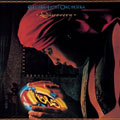 Words & Music: Jeff Lynne
Words & Music: Jeff Lynne
Original Version: Discovery (album) by Electric Light Orchestra (ELO), June 1979
Puffy's Version: One of two B-sides on the Hataraku Otoko single
The Electric Light Orchestra (also popularly known as ELO) featured Jeff Lynne (guitar, vocals, bass, etc.), Roy Wood (guitar, vocals, bass, etc.), and Bev Bevan (drums), with the lineup changing quite a bit as the years progressed. The band was like many late-60s/early 70s bands that tried to marry rock and classical music (perhaps inspired in part by songs like the Beatles' "I Am The Walrus"). Within a few years, Roy Wood left the group, leaving Jeff Lynne as the de-facto leader. Though the band stuck with classical music-inspired rock for a while, by the end of the 1970s their music became more mainstream, reflected in songs like the disco-y "Don't Bring Me Down" (which became a hit single).
Jeff Lynne has remained active in the music world since ELO's time at the top passed; he now works mainly as a songwriter and producer, including working closely with most of the ex-Beatles (especially George Harrison up until his death), and released a new album under the ELO name a few years back. Bev Bevan led "ELO Part II" for a short time in the early 1990s and even played drums with Black Sabbath for a while in the 1980s.
Return to Top
Hataraku Otoko
Words & Music: Tamio Okuda
Original Version: “Hataraku Otoko” c/w “CSA~Rock Shiawase” (single) by Unicorn, July 21, 1990
Puffy's Version: Hataraku Otoko single; also available on Hit & Fun
Tamio Okuda's tribute to the working men and women of Japan, recorded and released by his old band, Unicorn. The single was very successful, hitting #3 on the Oricon charts and staying on the chart for nearly four months. Additionally, Puffy's video for their version pays homage to Unicorn's original music video.
Return to Top
Hito Natsu no Keiken
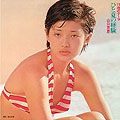 Words: Kazuya Senke Music: Shunichi Tokura
Words: Kazuya Senke Music: Shunichi Tokura
Original Version: "Hito Natsu no Keiken" (single) by Momoe Yamaguchi, June 1, 1974
Puffy's Version: Momoe Tribute: Thank You For... tribute album
Momoe Yamaguchi was a singer/idol in Japan in the 1970s, starting in 1972 when she was only 13 years old. Her songs, with lyrics that would still probably be considered risque, were immediate smashes. Though she moved away from controversial lyrical matter as her career progressed, she remained a strong seller on the record charts. Along with her superstar music career, Momoe also acted in many films - indeed, she met (and acted with) her future husband over a number of films in the 1970s. In 1980, while still very successful as a recording artist, Momoe retired in order to marry her sweetheart, and has not acted or recorded since.
The track "Hito Natsu no Keiken" was Momoe's fifth single (I believe), and was recorded when she was only 15 years old. From what I've read, it was a very successful single in Japan at the time.
Return to Top
I Wanna Be Your Man
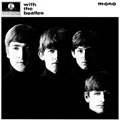 Words & Music: John Lennon & Paul McCartney
Words & Music: John Lennon & Paul McCartney
Original Version: "I Wanna Be Your Man" c/w "Stoned" (single) by The Rolling Stones, November 1, 1963; With The Beatles (album) by The Beatles, November 22, 1963
Puffy's Version: A short clip of Ami singing this song can be seen on Fever*Fever DVD
For many people (myself included), The Beatles - compromised of John Lennon (guitar, keyboards, bass, vocals), Paul McCartney (bass, guitar, keyboards, drums, vocals), George Harrison (guitar, bass, vocals), and Ringo Starr (drums, vocals) - are the greatest rock-and-roll band of all time. Their sound clearly influenced Puffy's producers - Tamio Okuda especially - which is one of the reasons I was initially drawn to Puffy. I could go on and on, but this is a site about Puffy, not The Beatles. But if you like Puffy, give the Fabs a chance (if you haven't already).
John Lennon and Paul McCartney (the two main songwriters in the Beatles) famously finished writing this song in front of the Rolling Stones in a club, then gave the song to the Stones to record as their second single, which then became a hit. Although the Rolling Stones' version was released first, the Beatles' own version of the song had been recorded for nearly two months by the time the Rolling Stones' single came out. The Fab Four's version saw release a few weeks later on the LP With The Beatles - coincidentally, With The Beatles was released the same day that President John F. Kennedy was assassinated in Dallas.
Potentially interesting fact: With The Beatles sold so many copies in the United Kingdom that it actually made the Top Singles chart (which, back then, was only based on number of copies sold, since singles outsold LPs by a very wide margin).
Return to Top
Lucy In The Sky With Diamonds
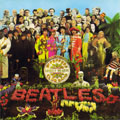 Words & Music: John Lennon & Paul McCartney
Words & Music: John Lennon & Paul McCartney
Original Version: Sgt. Pepper's Lonely Hearts Club Band (album) by The Beatles, June 1, 1967
Puffy's Version: First released on the Happy Birthday, John compilation, later released as a B-side on the Hataraku Otoko single
John Lennon was inspired to write this song after his son Julian came home from school with a drawing entitled "Lucy in the Sky With Diamonds." According to Lennon, the song (somewhat) tells a story about Alice in Wonderland and various characters she meets. To this day, many people make the counter-claim that the song is completely a song about illegal drugs (often referring to the song titles initials reading "LSD"), with the story about Julian Lennon being a red herring at best. As with many things, the truth probably lies somewhere in the middle: the drawing of Julian Lennon's exists - and thus was probably the starting point of the song - but it cannot be doubted that the songs of John Lennon (and a zillion other people) were, at the very least, partially influenced by drug use back then.
Elton John had a hit single with a cover of this song (featuring John Lennon on guitar and backing vocals) in 1974.
Return to Top
Nagisa no Sindbad
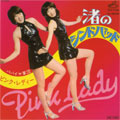 Words: Yuu Aku Music: Shunichi Tokura
Words: Yuu Aku Music: Shunichi Tokura
Original Version: "Nagisa no Sindbad" c/w "Papaya Gundan" (single) by Pink Lady, June 10, 1977
Puffy's Version: A short clip of Puffy singing this song (and Yumi screwing up Pink Lady's dance routine) can be seen on Fever*Fever DVD
For a few years in the late 1970s, Pink Lady (featuring Mitsuyo Nemoto a.k.a "Mie" and Keiko Masuta a.k.a. "Kei," both on vocals) was at the pinnacle of Japanese music - their first fifteen singles (released over a span of only three years) all hit the Top 20 in Japan, the first thirteen of which hit the Top 10 (and nine of those went to Number One). The duo was so big that they even managed to have a minor Top 40 hit in the U.S. (the second - and, to date, last - Japanese act to make the Billboard Singles chart) with the song "Kiss in the Dark," a rather unoriginal disco tune written and produced by Michael Lloyd, the man who put together the Dirty Dancing soundtrack in the 1980s, among other things (including producing The Monkees' 20th Anniversary reunion single, "That Was Then, This Is Now" in 1986).
"Nagisa no Sindbad" was Pink Lady's fourth single (third Number One single, I think), and a million-seller; like most of Pink Lady's singles through 1979, it was written by the songwriting team of Yuu Aku and Shunichi Tokura. Since the duo was more a singles act than an album act, the song didn't make it's first appearance on an LP (not counting live albums) until Pink Lady released their first greatest hits album six months after this single was released.
These days - in America, at least - Pink Lady are more remembered for their atrociously bad (supposedly - I've never seen it) comedy/variety show co-starring comedian Jeff Altman that aired on NBC for a few months in early 1980. In Japan, however, they remain pretty popular - even embarking on several successful reunion tours over the years, culminating with a final farewell tour in 2005.
Return to Top




 Words & Music:
Words & Music:





